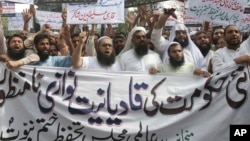Pakistan's new government Friday removed an internationally renowned scholar from its key Economic Advisory Council (EAC), bowing to the pressure and objections of Islamist and right-wing parties over his religious faith.
Economist Atif Mian, a Princeton University professor who belongs to Pakistan's long persecuted Ahmadi religious community, recently was chosen to be part of the 18-member panel to advise new Prime Minister Imran Khan.
Khan's government is faced with a looming debt crisis. Khan has pledged to introduce key reforms to address Pakistan's economic woes.
Just hours after the government announced names of the EAC members, hardline Islamists took to mainstream and social media to condemn and demand removal of the 43-year-old economist from the panel for being an Ahmadi.
Mian's unseating prompted another EAC member, Professor Asim Ijaz Khwaja of Harvard University, to step down — apparently dealing a blow to the new government's mission of economic revival.
"Have resigned from EAC. Painful, deeply sad decision. Grateful for chance to aid analytical reasoning but not when such values compromised. Personally as a Muslim I can't justify this. May Allah forgive/guide me&us all. Ever ready to help. Pakistan Paindabad (long live)," Khwaja tweeted.
There was no immediate reaction from the government to the announcement by Khwaja.
Strong reaction
Federal Information Minister Fawad Chaudhry initially dismissed the backlash, saying, "Pakistan belongs as much to its minorities as it does to the majority."
His remarks, however, fueled the outrage and even sparked calls for the minister's resignation for defending a "non-Muslim."
The strong reaction, and threats of street protests by the radical Tehreek-e-Labbaik Pakistan (TLP) party, prompted the government Friday to reverse its decision to nominate Mian.
"The government wishes to move forward together with all religious scholars and social classes, and if one appointment creates a different impression, then that is not appropriate." Chaudhry tweeted on Friday.
Professor Mian is regarded as one of the world's top economists and is the author of the internationally acclaimed book, House of Debt. He also has taught at the University of California, Berkeley and the University of Chicago Booth School of Business.
Hardline rising
Mian said in a series of tweets (@AtifRMian) that he stepped down for the sake of the stability of the government.
"I have resigned from the Economic Advisory Council, as the Government was facing a lot of adverse pressure regarding my appointment from the Mullahs (Muslim clerics) and their supporters."
"Nevertheless, I will always be ready to serve Pakistan as it is the country in which I was raised and which I love a great deal. Serving my country is an inherent part of my faith and will always be my heartfelt desire," the scholar tweeted.
Ahmadis consider themselves to be Muslims but their belief that the founder of the sect was a "subordinate prophet" runs counter to the belief of Pakistan's Sunni majority that the Prophet Mohammad was God's last direct messenger.
The backtracking by the government on a key appointment, critics noted, underscored the growing influence of hardline Islamist groups in Pakistan, who collectively bagged about 10 percent of the vote in recent national elections.
Pakistan declared Ahmadis heretical in 1974 at the behest of Islamic parties. The move has since led to targeted killings of members and leaders of the minority community. Ahmadis regularly complain of social discrimination over accusations of blasphemy.
Abdus Salam, Pakistan's first Nobel Prize winner for his work in theoretical physics, was also an Ahmadi. He left the country in protest soon after his community was declared non-Muslim.
Salam died in 1996 in England and was buried in Rabwa, Pakistan, where extremists defaced his gravestone to remove the word Muslim.




